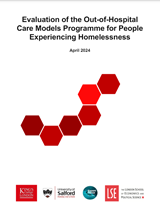Evaluation of the Out-of-Hospital Care Models Programme for People Experiencing Homelessness

Following the Covid-19 pandemic a new hospital discharge and community operating model was introduced in England. This included the evidence-based recommendation that Home First Discharge to Assess (D2A) should incorporate specialist step-down intermediate care services for people experiencing homelessness.
£16 million of funding was allocated to 17 test sites across England under a Department of Health and Social Care Out-of-Hospital Care Models Programme for People Experiencing Homelessness (OOHCM). It helped facilitate learning around how to mobilise, integrate, scale and sustain specialist services as part of the D2A hospital discharge and community operating model.
Undertaken by King's College London and funded by the National Institute for Health and Care Research (NIHR) Policy Research Unit in Health and Social Care Workforce, the evaluation demonstrates the considerable benefits of providing specialist out-of-hospital care services for people experiencing homelessness. It shows that test site services improved outcomes for most patients and were associated with very positive patient experiences. It reported a stay in step-down significantly reduced the numbers of people discharged to the street. For example, one earlier study suggested that 70% of patients were discharged to the street. However, encouragingly, in test sites, where specialist step-down intermediate care was in place, the figure was between 4% and 5%. Despite this positive result, the evaluation had issues regarding sustainability. The findings include that:
- too few step-down services (of all types) means that many homeless patients are still being discharged to a setting that will not maximise their outcomes or improve their lives
- OOHCM Programmes bring many benefits to systems (facilitating learning, collaboration, single system coordination and improved data quality) but struggle to deliver sustainable transformative change in challenging economic climates.
If you found this of interest, also read this 2020 Housing LIN guest blog from the Gloucestershire Health and Care NHS Foundation Trust test bed.
